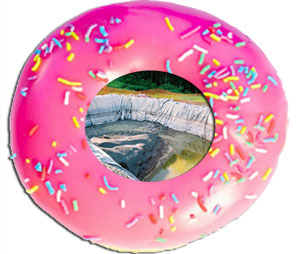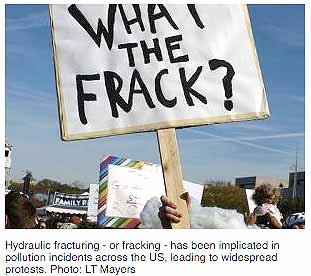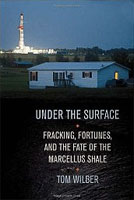Biblio
"Of the 84,000 chemicals in commercial use in the United States -- from flame retardants in furniture to household cleaners -- nearly 20 percent are secret, according to the Environmental Protection Agency, their names and physical properties guarded from consumers and virtually all public officials under a little-known federal provision."
The gas stored in the Marcellus Shale formation is the subject of desperate drilling to secure US domestic energy supplies. But the process involved - hydraulic fracturing - is the focus of a bitter dispute over environmental damage and community rights.
It is a timeless patchwork of small dairy farms and endless hills, emblazoned with the blood-red tints of an autumnal Pennsylvania forest. Set against this sleepy backdrop, however, the constant convoys of water trucks rumbling along the deserted country roads suggest something profound is taking place. This is ‘fracking’ country, the latest frontier in America’s desperate search for fossil fuels.
Pioneered by companies such as Halliburton, high-volume horizontal slickwater fracturing – otherwise known as hydraulic fracturing, or simply fracking – involves the drilling of horizontal wells that are then injected with large volumes of water, sand and chemicals at high pressure to open up rock fractures and help propel rock-trapped gas back to the surface.
Professor Anthony Ingrafea, one of the world's leading experts on fracture mechanics, based at Cornell University, told the Ecologist:
...there is an overriding urgency to slow down the fracking rush. 'I'm not anti-oil and gas. What I'm against is an industry that is so out of control in using a new technology that does not have proper regulation, and enforcement of regulation, that they're riding roughshod over a large segment of the population.'
Abstract:
As the hunt for important unconventional gas resources in America expands, an increasingly popular method of wringing resources from stubborn underground formations is a process called hydraulic fracturing – also described as hydrofracturing, fracking, or fracing – wherein fluids are pumped at high pressure underground to fracture a formation and release trapped oil or gas.
Operators have fraced wells for more than fifty years, but the practice has recently grown rapidly in areas like the Barnett Shale of North Central Texas and the Marcellus Shale beneath Pennsylvania, New York, and other Appalachian states.
This Article describes the process of hydraulic fracturing, existing studies of the environmental effects of hydraulic fracturing, and the laws and regulations that apply to the practice. It argues that there is no direct federal regulation of the fracing process (the pumping of fluids into a wellbore), that court guidance in this area is limited, and that state regulations differ substantially.
Although other general regulations apply to the practice, the Article argues that in light of the dearth of regulation specific to fracturing in some areas, more study of the potential environmental and human health effects of fracing is needed in order to determine whether current regulation is sufficient. The EPA completed a partial study in 2004, but this Article focuses on the deficiencies of that study and calls for a new, national, scientific study of the practice.
Conclusion:
...no one knows the full range of effects because they have not been adequately researched. The EPA’s report is the most comprehensive to date, but was part of a highly-charged political process and was never completed, because the EPA concluded, perhaps prematurely, that further study was unnecessary.
Furthermore, the report investigated fracing in only one type of formation – coalbeds – and assessed the impacts of one stage of fracing, failing to seriously consider concerns such as groundwater depletion and surface disposal of fracing waste.
The highest regulatory priority for fracing should be the instigation of a federal, scientifically rigorous report prepared by the National Academy of Sciences or a similar “neutral” body and a simultaneous regulatory risk-limiting mechanism.
Next, based on the data contained within this report, and given the risks of certain types of fracing, Congress should consider reversing its 2005 exemption of fracing from the Safe Drinking Water Act; it should not wait to commence this process pending the completion of the report, although the report will be essential for future statutory and regulatory decisions.
...In the rush to extract essential resources, a process which itself contributes to human wellbeing, other aspects of human wellbeing – the quality of the environment and public health – must not be cast aside as a mere impediment to progress.
See: Oil & Gas Accountability Project (OGAP)
See also: Pew Campaign for Responsible Mining
Universal Well Services is one of the large companies being investigated by the U.S. House Energy and Commerce Committee to see if the gas extraction method known as hydraulic fracturing, or fracking, is a hazard to groundwater drinking supplies.
According to its website, Universal is a premier source for hydraulic fracturing, cementing, nitrogen and acidizing services in the Appalachian Basin.
With its corporate headquarters in Meadville, Pa, Universal Well Services, Inc has grown from 200 employees in 2002, to over 800 employees at the end of 2007. Universal Well Services is a division of Patterson-UTI, and the parent company of Eastern Reservoir Services.
Universal’s services in the Appalachian Basin include hydraulic fracturing, as well as acidizing, cementing and nitrogen services. Specialty services include engineering, chemical cleaning, jetting and high pressure pumping.
Several million gallons of "frack" fluid for each well return to the surface as a heavy brine, far saltier than seawater. Disposal of these new volumes of brine is a challenge.
So far, well operators or their agents have been hauling most of the frack flowback to Ohio for underground injection, according to Peterson, because salt removal is expensive and only two Class II, or brine disposal, wells were permitted by West Virginia's Underground Injection Control program.
Now, though, nine commercial brine disposal injection wells are permitted, and seven are operating. Several more are in the permitting pipeline.
The DEP has not in the past required well operators to report their water management in detail.
See: Desalination of Oil Field Brine
See: Gas wells' leftovers may wash into Ohio | Columbus Dispatch Politics
Fast Food Energy: Mom and Dad’s Great American Gas Rush.
Neil Zusman
Wilber, Tom. Under the Surface: Fracking, Fortunes and the Fate of the Marcellus Shale. Ithaca: Cornell University Press, 2012. Print.
Hydrofracking’s proposed a massive industrial transformation on a huge swath of the rural Northeastern U.S. and has divided communities and sparked an intense public debate touching on our method of economics, law making and enforcement. The book under review, Under the Surface, is one of less than 100 books published on the subject of hydraulic fracturing or fracking. Author Tom Wilber covered the environmental beat for Binghamton, N.Y.’s Press & Sun Bulletin.
Even George W. Bush said in a Presidential speech, that "Americans are addicted to oil". In my opinion, we are also addicted to natural gas and it is being pushed by the industry and abetted by govenments. A Theory of Rational Addiction (1988) by economists Gary Becker and Kevin Murphy, argued that shooting heroin is a logical choice when all you're giving up is a crappy existence. 1
Time’s humorist, Joel Stein, wrote about “Instant Gratification”. 2 Has everything in our culture become humorous? The controversy over how fast to develop the natural gas that lies beneath the Northeastern U.S. has not had the privilege of humor that Stein brings to his observations on self-gratification, or his penchant to deliver it in his own narcissistic, Seinfeld-esque 'cult of personality' idiom. Nevertheless, the fatter we all get craving our Big Macs, carbonated corn syrup, and drugs; the richer a few of us will become. The longer we are told to believe that hydrofracking is, in Terry Engeldr's words, 'a Christmas present for America', the more we will accept it as inevitable.
 3
3
It took an insider at the cigarette industry to finally confirm what the Surgeon General was trying to tell us 30 years earlier. And yet, the labels and warnings and widespread anti-smoking campaigns will not keep me from my craving. I may need a cigarette today and I am sure that I can get it. I don’t have that app that shows me what I will look like when I’m 80. Stein’s app would change my picture of the 80 year old me posted electronically on my fridge each time I eat a jelly glazed doughnut. The app for the cigarette smoker – would likewise factor the algorithms of that gratification. And our energy craving…trouble is, the math guys don’t have the data for that one.
In fact, so much of this stuff has been covered up and fabricated, that it’s hard to get any real data at all. The University of Pennsylvania had to eat crow over “The Penn State Report”. 4
“Graham Spanier, president of the university received a letter from an advocacy group complaining that the so-called Penn State report confused academic research with propaganda by its industry sponsors.”
…Spanier ordered William Easterling, dean of the college that published the report, to address the complaint. A few weeks later, Saxton (president of the Board of Responsible Drilling Alliance) received a reply from Easterling conceding that an internal review “found flaws in the way the report was written and presented to the public.” The fact that the report failed to identify its sponsor was a “clear error”. 5(p98)
 6
6
None of this stuff is illegal though. It’s a free market. As if that were everything.
Investors are satisfied with the way a cigarette or sugar doughnut or Big Mac works on our brain. Is that funny? Tom Wilber asks if will it be boom or bust and cites the work of Janette Barth.5(p101) Susan Christopherson and Ned Rightor, in "How Should We Think About the Economic Consequences of Shale Gas Drilling?" 7 have also wondered about that in a Park Foundation funded study. Who to believe?
Will our children grow up to be gas engineers or scholars, musicians or maids in the halls of the energy elite? We want them to be prepared. Will they be able to compete in the free market? And what about nature? What is a life worth? The EPA has put a valuation on it. 8 It’s worth about 7.9 million dollars. Is that chump change?
Humor is a challenge that may not be begged of Mr. Wilber’s reporting. He never intended his book to be funny. He gets both ends of the story on flowback, which are recovered fracturing fluids. According to the EPA’s web page, “Hydraulic Fracturing Background Information”, 9 disposal options for flowback include discharge into surface water or underground injection. Treatment is typically performed by wastewater treatment facilities. How companies deal with the disposal of the millions of gallons per well of waste-water produced in the gas extraction process is apparently well-known and regulated, but Wilber reveals that
“…There was something else that bothers Ken [Ely]. He hadn’t anticipated the wells on his land would produce so much waste. This included not only the spent chemical solution used to stimulate each well, but tens of millions of gallons of brine and whatever else came up from the holes. The flowback was supposed to be treated and disposed of at plants equipped to handle it, yet nobody could tell Ken exactly where those plants were.
…When I [Wilber] asked regulators where the flowback was being treated, they told me it was a question for the companies. When I asked company representatives, they told me, “It’s all regulated.” 5(p86)
Now that’s funny.
He interviewed Terry Engelder, who released the potential of the Marcellus Shale in the “Penn State Report”. He estimated there are 500 trillion cubic feet of natural gas waiting to be discovered. By Tony Ingraffea’s calculations, the Cornell engineering professor who has criticized the rush to develop the gas resource so quickly, it will take 400,000 wells to get to it, with each well requiring 5 million gallons of fresh water. That’s 2 trillion gallons of water going in, and somewhat less coming out that would need to be trucked, disposed of, or treated, or injected into the ground. Cayuga Lake, which is 40 miles long, 2 miles wide, and has a maximum depth of 435 feet, contains a total of 2.5 trillion gallons of water. 10
Wilber’s book reminds us how the facts of the water draw are not just about measuring the water usage and arguing those numbers, the huge impact that hundreds of thousands of truck trips on county roads will have on rural communities will be catastrophic, notwithstanding the composition of the wastewater itself.
The Marcellus Rush is all humorless self-indulgence, fancy landmen with Texan drawls and cowboy hats who look like your grandfather; engineers and scholars who think they’ve discovered the next big thing; and then the one after the big thing that will save us from the next big thing. Wilber gives us the Terry Engelder character, larger than life:
“He thought of the Marcellus discovery as a Christmas present for America; and on his drive home, after days of thinking about the possibilities, he was given to playing the Radetzky March by Johann Strauss…” 5(p96)
Somewhere in Washington, EPA Director Lisa Jackson’s speechwriter, tunes her Cello, and begins to play Bach’s Solos for Cello. Have you listened to those speeches? 11
If my life is so crappy that I don’t care if I smoke a pack a day or shoot heroin, whose job is it to stop me? I can buy any brand I want. Some brands even offer healthy alternatives. If I live in a poor neighborhood and can’t get a supermarket nearby, the government might have a program to encourage a market to open so I won’t have to live on Wendy’s or Big Macs. We like this stuff, we eat it to obesity and vote for it with our dollars; but the U.S. government tells me that I need a better diet, more choices. When it comes to energy, I can use natural gas, or… natural gas. I can put gasoline in my tank, or gasoline… People are buying electric cars. Maybe the trend is shifting.
“I asked Hanger where natural gas fit into his vision of green energy. It was better than coal, he said, the mining of which destroys mountaintops and the burning of which produces CO2 gases and mercury that accumulate in the food chain. In his view, a surge in the development and demand for alternatives, including solar panels, is imminent, due mostly to China’s burgeoning interest in the industry. “The baby has been born,” he said. "China is intent on building solar panels for the world. Those changes will come and those changes will be rapid – less than five years." 5(p204)
The cult of personality, as portrayed so eloquently in this important book, may be in need of a sense of humor and the self-deprecating sarcastic one-liner to make them marketable, but they have brought out our need to think about energy, the best thing our planet of humankind needs.
At one end of the spectrum were characters who
“…embraced the industry as an expression of old-fashioned free enterprise…At the other end of the spectrum were those who saw the industry as a relic of grandfather clauses and cronyism that dated to a period of predatory exploitation, when fantastical deals were pitched by door-to-door peddlers, manufacturing waste was buried in lagoons on private property, and unions were nonexistent. The middle ground was occupied by an untold number of consumers used to cheap plentiful energy, and property owners, who had their worries but also were able to calculate how much a mineral rights lease might be worth.” 5(p104)
Wilber draws the sides in as divisive and rude a public debate as one might expect to see on Fox TV. I don’t know why it hasn’t been picked up as a reality show yet, but it may be soon. Stu Gruskin, former asst. head of the NYS DEC admires civil discourse on his blog.12 He sounds like a sweet anachronism. I bet each side of this debate would like to call each other “big fat idiots” the way Al Franken tells it in his book on Rush Limbaugh13 or in Lies – and the Lying Liars who Tell Them, investigating the fabrications published by Bill O’Reilly, Ann Coulter, and Sean Hannity. One of Franken’s big ideas in Lies is that even good journalists contribute to the lie, taking at face value the reporting of their colleagues and re-iterating the report without investigation. 14 Wilber investigates.
References
1. Murphy KM, Becker GS. A Theory of Rational Addiction. Journal of Political Economy. 1988;96(4):675-700.
2. Stein J. "Instant Gratification." Time. 2012. Available at: http://www.time.com/time/magazine/article/0,9171,2113162,00.html [Accessed May 2, 2012].
3. Zusman N. Mashup of Hubbard 1, 6-H, 5-H, Springville, PA by Helen Slottje and Homer Simpson Doughnut. 2012. Available at: /frack_files/frac-pond-Helen-Slottie.jpg [Accessed April 28, 2012].
4. Glass I. This American Life Search Archive 440: Game Changer Transcript. Available at: http://www.thisamericanlife.org/radio-archives/episode/440/transcript [Accessed May 2, 2012].
5. Wilber T. Under the surface : fracking, fortunes and the fate of the Marcellus Shale. Ithaca: Cornell University Press; 2012.
6. Guariglia J. Cancer - Rogue Cells | Photo by Justin Guariglia. Available at: http://science.nationalgeographic.com/science/health-and-human-body/huma... [Accessed May 2, 2012].
7. Christopherson S, Rightor N. Working Paper Series: A Comprehensive Economic Impact Analysis of Natural Gas Extraction in the Marcellus Shale | How Should We Think About the Economic Consequences of Shale Gas Drilling? 2011. Available at: http://www.greenchoices.cornell.edu/downloads/development/marcellus/Marc....
8. Appelbaum B. "A Life’s Value May Depend on the Agency, but It’s Rising." The New York Times. 2011. Available at: http://www.nytimes.com/2011/02/17/business/economy/17regulation.html?_r=... [Accessed February 17, 2011].
9. U.S. Environmental Protection Agency (EPA): Office of Ground Water and Drinking Water OW. U.S. Environmental Protection Agency (EPA): Hydraulic Fracturing Study (2010-2012). Available at: http://water.epa.gov/type/groundwater/uic/class2/hydraulicfracturing/ind... [Accessed April 13, 2010].
10. Cayuga Lake Watershed Network. 2005. Available at: http://www.cayugalake.org/network/faq.php [Accessed May 2, 2012].
11. Jackson L. Lisa P. Jackson, EPA (lisapjackson) on Twitter. 2010. Available at: http://twitter.com/lisapjackson [Accessed January 11, 2011].
12. Gruskin S. Stuart Gruskin - Google+ - It's refreshing to read about public officials that are... Stuart Gruskin - Google+. 2011. Available at: https://plus.google.com/115541440669480452148/posts#11554144066948045214... [Accessed May 2, 2012].
13. Franken A. Rush Limbaugh is a big fat idiot and other observations. New York: Delacorte Press; 1996.
14. Franken A. Lies : and the lying liars who tell them : a fair and balanced look at the Right. New York: Dutton; 2003.
See also: Wilber, Tom. “Shale Gas Review.” Shale Gas Review, 2011. http://tomwilber.blogspot.com/.
Congressional Research Service. Anthony Andrews, Coordinator, Specialist in Energy and Energy Infrastructure. CRS Report for Congress Prepared for Members and Committees of Congress. October 30, 2009. 53 pages.
"...The saline “flowback” water pumped back to the surface after the fracturing process poses a significant environmental management challenge in the Marcellus region."
The Congressional Research Service (CRS) serves shared staff to congressional committees and Members of Congress. CRS experts assist at every stage of the legislative process — from the early considerations that precede bill drafting, through committee hearings and floor debate, to the oversight of enacted laws and various agency activities.
See: What is the Congressional Research Service?
It is ironic that the following report was about to be published on April 20, 2010, the day the BP Deepwater Horizon platform caught fire, resulting in the largest oil spill in U.S. history.
See also:
Humphries, Marc, Robert Pirog, and Gene Whitney. U.S. Offshore Oil and Gas Resources: Prospects and Processes. Washington, D.C.: Congressional Research Service, April 26, 2010. (PDF).
Additional authors of Unconventional Gas Shales:
Peter Folger
Specialist in Energy and Natural Resources Policy
Marc Humphries
Analyst in Energy Policy
Claudia Copeland
Specialist in Resources and Environmental Policy
Mary Tiemann
Specialist in Environmental Policy
Robert Meltz
Legislative Attorney
Cynthia Brougher
Legislative Attorney
because there is nothing natural about what the natural gas extraction process invented by Halliburton does to water, air, & living things
Includes extensive background information and petition.
See article on Eminent Domain.
See: Is Your Unleased Property Facing Compulsory Integration?
Site contains link to Dr. Ronald E. Bishop, Sustainable Otsego. "Beyond MSDS: A Review of Hazardous Materials Used by New York’s Natural Gas Industry." Cooperstown, NY. September 18, 2009.
"The New York Department of Environmental Conservation (DEC), in response to a Freedom of Information Law request from the Committee to Preserve the Finger Lakes, sent material safety data sheets (MSDS’s) for 48 products permitted for use in the drilling and development of natural gas wells in New York. These are posted online by the Finger Lakes chapter of the Sierra Club.
From these and many other documents, Steve Coffman of the Committee to Preserve the Finger Lakes, developed a wonderful article: "The Safety of Fracturing Fluids – A Quantitative Assessment".
An archived Nancy Pelosi blog page.
Americans need Consumer Protection when it comes to Energy and Power.
See The CLEAR Act. (2010): In the wake of the BP disaster, Congress is acting on its commitment to protect America’s families and businesses, rebuild the Gulf Coast, hold BP and oil companies accountable, and work to ensure that a spill of this kind never happens again.
On July 30th, the House passed the CLEAR Act (H.R. 3534) by a vote of 209-193—legislation to effectively prevent and respond to oil spills and protect our coastal communities and waters:
Pelosi has been on it! The MMS has failed us. State monitoring of Horizontal Drilling will not protect consumers. Gas Drilling needs the same Federal scrutiny as Oil Drilling.
Speaker of the U.S. House of Representatives Nancy Pelosi's blog, includes statements by government representatives on 110th congress H.R.6899 Comprehensive American Energy Security and Consumer Protection Act.
The MMS (Minerals and Mining Service) was first brought to my attention through Pelosi's Blog.
Natural Resources Hearing on the Department of Interior Scandal
Thursday, September 18th, 2008 by Karina
Today, the House Natural Resources Committee, led by Chairman Nick J. Rahall, is holding a full Committee oversight hearing on “Recent Interior Department Inspector General Investigations on Federal Oil and Gas Royalty Collections.” Secretary of the U.S. Department of the Interior Dirk Kempthorne and Department of the Interior Inspector General Earl Devaney are testifying. Watch the live webcast.
Speaker of the House Nancy Pelosi's (D-CA) Newsroom Web Page. Includes links to Energy & Commerce Commitee website. The American Clean Energy and Security Act (2009).
For the other side of the Energy debate, see John Boehner's Blog.
Question and Answer period starts at 52:00. See: Potential Gas Committee reports unprecedented increase in magnitude of U.S. natural gas resource base.
(January 20, 2010) John Curtis, Professor of Geochemistry and Director of the Potential Gas Agency at the Colorado School of Mines, discusses a broad range of perspectives on the state of U.S. shale gas reserves and resources along with the industries and technologies that are involved in extracting and bringing these energy resources to market.
![]() PRESS CONFERENCE: Senator Boxer to Hold Press Conference on Murkowski Proposal to Overturn EPA Global Warming Endangerment Finding.
PRESS CONFERENCE: Senator Boxer to Hold Press Conference on Murkowski Proposal to Overturn EPA Global Warming Endangerment Finding.
Thursday, January 21, 2010
U.S. Senator Barbara Boxer (D-CA), Chairman of the Senate Environment and Public Works Committee, will be joined by other Members of the EPW Committee and public health and environmental leaders to discuss Senator Lisa Murkowski’s (R-AK) proposal which would strip the authority under the Clean Air Act to protect children and families from carbon pollution.
The Subcommittee on Energy and Environment will hold a hearing entitled, "Endocrine Disrupting Chemicals in Drinking Water: Risks to Human Health and the Environment," on Thursday, February 25, 2010, at 9:30 a.m. in room 2322 of the Rayburn House Office Building.
This hearing will examine the science and regulation of endocrine disruptors that may be found in sources of drinking water. Posted Tuesday, 23 February 2010. See TEDX — The Endocrine Disruption Exchange.
INVITED WITNESSES:
- Jim Jones, Deputy Assistant Administrator, Office of Prevention, Pesticides and Toxic Substances, Environmental Protection Agency
- Linda S. Birnbaum, Ph.D., D.A.B.T., A.T.S., Director, National Institutes of Environmental Health Sciences
- Gina Solomon, M.D., M.P.H., Senior Scientist, Natural Resources Defense Council
- Christopher J. Borgert, Ph.D., President and Principal Scientist, Applied Pharmacology and Toxicology, Inc.
U.S. Senate. Committee on Environment and Public Works. Health Risks to Children and Communities From Recent EPA Proposals and Decisions on Air and Water Quality.
Submitted in Writing to Hearings before the Committee on Environment and Public Works,on February 6, 2007. Statement of Gina M. Solomon, M.D., M.P.H., Senior Scientist Natural Resources Defense Council, Associate Clinical Professor of Medicine University of California, San Francisco. 19 pages.
"Unfortunately, EPA is taking several major steps to eliminate information and decrease health protection from environmental hazards. Six recent draft or final EPA rules will each significantly limit critical information available to scientists, health care providers, communities, and ironically to EPA itself. As a result, children and communities will be left less protected and less able to protect themselves."
House Republican Leader John Boehner's blog. Posted by Kevin Boland on July 14th, 2009.
Boehner said, "Democrats talk about creating jobs - but Speaker Pelosi’s national energy tax will cost 2.5 million American jobs each year and will punish every American who dares to flip on a light switch or drives a car.
Democrats are also floating a half-a-trillion dollar tax hike on small businesses as part of their trillion-dollar government-run health care proposal, another sure job-killer."
Boehner was first elected to Congress in 1990, representing a district that includes parts of the suburbs of Cincinnati and Dayton. As a member of Gang of Seven, a group of G.O.P. freshman reformers who demanded that the names of colleagues who had overdrafts at the House bank be made public, Mr. Boehner angered Congressional veterans.
But he quickly became a top lieutenant of Newt Gingrich, the Republican leader in the House who became speaker when the party took control in 1994. Mr. Boehner helped to draft and champion the party's Contract With America. Read More...
For the other side of the Energy Debate, see Speaker of the House Nancy Pelosi's (D-CA) Newsroom Web Page, and her blog, The Gavel-Draining the Swamp.





















